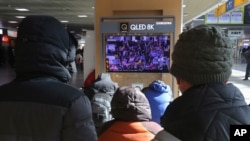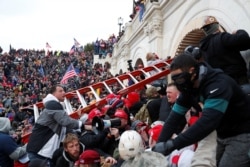South Korea, whose political development and systems of government have long been influenced in part by the United States, is reacting with bewilderment to this week's deadly post-election violence in Washington, D.C.
People angry at President Donald Trump’s defeat in the recent U.S. election forcibly entered the U.S. Capitol on Wednesday, scuffling with police, vandalizing congressional offices, and prompting scenes of chaos, including armed standoffs, which resulted in lawmakers being temporarily evacuated.
Capitol Police shot one woman to death after she attempted to break through a barrier inside the building, while three others died from unspecified “medical emergencies,” according to police. Police also say they discovered two pipe bombs outside the Democratic National Committee and Republican National Committee.
Many in South Korea, formerly ruled by military strongmen but now consistently ranked as one of Asia’s strongest democracies, expressed confusion and disgust about the rocky transfer of power in Washington.
“I really don’t understand how this could be happening,” Yang Seung-hyun, a 41-year-old freelance businessman in Seoul’s Sinchon neighborhood, told VOA. “I don’t know how exactly it relates to South Korean politics, but I know it sure doesn't look good.”
South Korea’s government has not commented on the violent intrusion of the Capitol building. But senior lawmaker Song Young-gil, a member of South Korea’s ruling Democratic Party, said in a Facebook post the incident “revealed the shameful side of the United States.”
“This kind of behavior can be exploited by dictatorships who want to justify their behavior,” added Song, who did not elaborate. “I look forward to seeing the United States restore its system.”
Heated political battles
South Korea is no stranger to feisty domestic political battles.
Most notably, mass protests in 2016-17 led to the impeachment of former President Park Geun-hye, who was later convicted in a corruption scandal that could eventually see her jailed for over 20 years.
South Korea’s three other living ex-presidents have also been convicted of criminal offenses.
At South Korea’s National Assembly, occasional scuffles break out between lawmakers. There have also been instances of South Korean protesters attempting to breach the legislature.
But in South Korea, those attempts are not usually successful, points out Lee Sang-sin, who focuses on political science and public opinion at the Korean Institute for National Unification (KINU).
“Korean riot police are much more formidable than D.C. ones. And Korean mobs are not armed with guns,” Lee said, thanks in part to South Korea's strict gun ownership laws.
Kim Ha-neul, a 29-year-old nurse who lives in Seoul, said she was surprised to see such intense unrest in the United States. “And I don't understand why police in the U.S. didn't care about this (storming of the Capitol),” she added.
Rocky transfer of power
It’s not clear how many rioters, if any, possessed firearms when they barged into the Capitol. The rioters were furious about what they claim is election fraud that delivered key swing states to Trump’s opponent, former Vice President Joe Biden.
Trump’s own Justice Department has denied allegations of serious voter fraud in the Nov. 3 election. Scores of legal challenges by Trump and his allies have failed.
Instead, Trump attempted to convince Republican members of Congress, as well as Vice President Mike Pence, to delay or overturn the results of the election using a largely ceremonial parliamentary procedure meant to count the electoral votes.
Hours before the vote-counting meeting convened Wednesday, Trump addressed a crowd of supporters on the National Mall, urging them to relocate to the nearby Capitol. A short time later, the chaos ensued, prompting Trump to send follow-up messages encouraging his supporters to be peaceful and then go home.
Once the Capitol was secured, lawmakers reconvened and eventually certified the election results, meaning Biden will be inaugurated on Jan. 20.
The White House later released a statement insisting Trump would commit to an "orderly transition."
New era?
Many in Seoul hope the incoming Biden administration will mark the end of a testy era in U.S.-South Korea relations.
As president, Trump regularly complained that Seoul did not pay enough for the approximately 28,000 U.S. troops stationed in South Korea.
Trump often talked about the issue in blunt terms, accusing South Korea of “freeloading,” or taking advantage of U.S. protection. At one point in 2019, Trump suggested South Korea was "rich as hell and probably doesn't like us too much."
Though the military cost-sharing issue was a constant source of friction, officials from both countries insist the overall relationship remains solid.
Biden has promised to bolster the alliance, which has been in place since the end of the 1950-53 Korean War -- virtually the entirety of South Korea’s existence.
US still a model?
Since then, the United States has played a crucial but complicated role in the political development of South Korea.
The U.S. for decades supported and armed South Korea’s brutal military rulers, even while supporting civil society and other programs meant to foster democracy and the rule of law.
As a result, some aspects of Korean political institutions and civil society now mirror those in the United States.
Among the shared features are the presidential system, the separation of powers among three branches of government, and the basic rights outlined in the constitution, said Ben Engel, a doctoral student who researches U.S. policy and influence in South Korea.
“The U.S. was definitely a model they looked at, as were other places,” Engel said. “But Koreans have also tried hard to overcome the weaknesses in the U.S. system.”
South Korea has now been a democracy since 1987. And although many here still see the U.S. as a model, it’s becoming tricker, said Lee of KINU.
"America’s image among Koreans is closely linked with how we view ourselves,” Lee said. “If America can be no longer our role model then we must find our own path."






